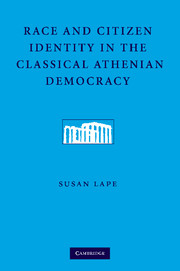Book contents
- Frontmatter
- Contents
- Preface
- Acknowledgments
- RACE AND CITIZEN IDENTITY IN THE CLASSICAL ATHENIAN DEMOCRACY
- 1 Theorizing Citizen Identity
- 2 The Rhetoric of Racial Citizenship
- 3 Euripides' “Ion” and the Family Romance of Athenian Racialism
- 4 Athenian Identity in History and as History
- 5 Trials of Citizen Identity: Policing and Producing the Racial Frontier
- 6 Myths and Realities of Racial Citizenship
- Abbreviations
- References
- Index of Names and Subjects
- Index of Passages Discussed
2 - The Rhetoric of Racial Citizenship
Published online by Cambridge University Press: 05 May 2010
- Frontmatter
- Contents
- Preface
- Acknowledgments
- RACE AND CITIZEN IDENTITY IN THE CLASSICAL ATHENIAN DEMOCRACY
- 1 Theorizing Citizen Identity
- 2 The Rhetoric of Racial Citizenship
- 3 Euripides' “Ion” and the Family Romance of Athenian Racialism
- 4 Athenian Identity in History and as History
- 5 Trials of Citizen Identity: Policing and Producing the Racial Frontier
- 6 Myths and Realities of Racial Citizenship
- Abbreviations
- References
- Index of Names and Subjects
- Index of Passages Discussed
Summary
FROM ATHENIAN BIRTH TO CITIZEN IDENTITY
Racialism (i.e., the package of beliefs associated with having legitimate Athenian birth) was not always the most salient component of citizen identity. Individuals identified as citizens in different ways in different contexts; and as with any social identity, some individuals were high identifiers, meaning both that it did not take much to trigger their identification and that they were deeply committed to this identity, while other individuals were (for various reasons) low identifiers. For instance, some undoubtedly understood themselves more often and more profoundly through lenses not directly tied to citizenship, perhaps as aristocrats, athletes, elites, and so forth. But, whether an individual was strongly or less strongly identified as a citizen, the birth norms of citizenship (the need to have two Athenian parents, rather than only one) provided a common framework for elaborating the meaning of citizenship as an identity. That is, birth and ancestry supplied key terms through which individuals could articulate and understand the content of citizen identity.
Just as the racial coordinate of citizenship was not always the paramount basis for identification (e.g., gender was sometimes primary), so also the way citizens translated ideas about birth into a language of citizen identity differed in accordance with the individual's personal history and the overall speech context. For instance, someone whose family gained a non-Athenian member either before the passage of the Periclean law or during a period in which it had lapsed (see Chapter 6) would be unlikely to highlight the hereditary basis of civic competencies and loyalties.
- Type
- Chapter
- Information
- Publisher: Cambridge University PressPrint publication year: 2010



